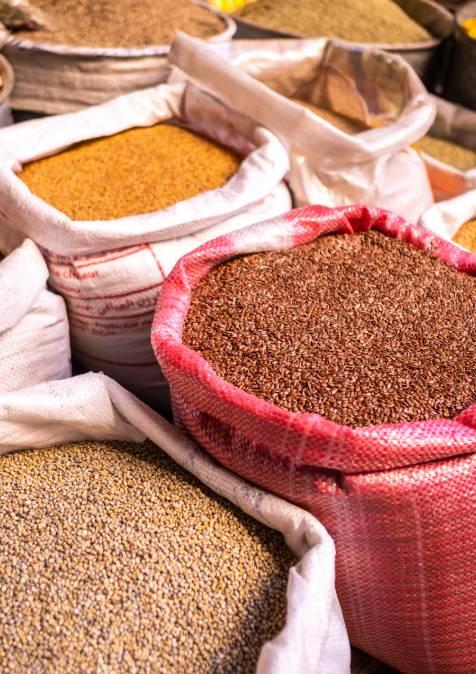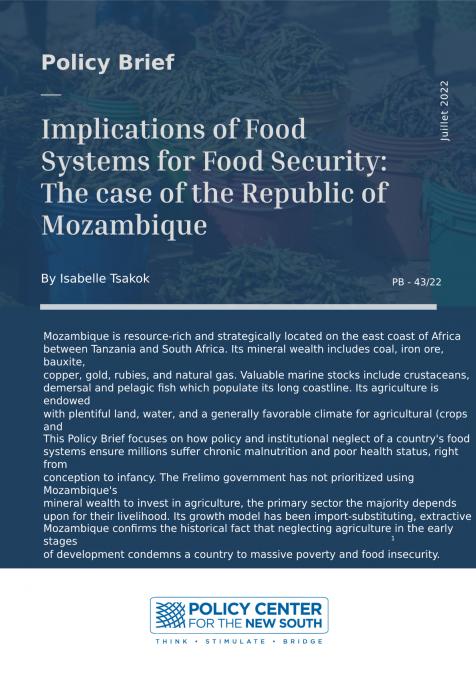Publications /
Opinion
Seleman Yusuph Kitenge an alumnus of Atlantic Dialogues Emerging Leaders program. Learn more about him here.
- Introduction
Food security refers to the availability of sufficient, safe, nutritious food for all people to maintain a healthy and active life (FAO, 2021; Suleri, 2022). It affects people at global, regional, national, sub-national, and household levels, and presents itself in different forms, including chronic, acute, and transient. Food insecurity exacerbates social tensions arising from poverty and inequality, and can be a threat multiplier to national security (FAO, 2021; Constain, 2022).
Food security in Africa promotes human development through industrialization, education, health, and infrastructure development (FAO, 2021). Without access to food, people cannot fully participate in national development activities, and may turn to crime, which threatens national security. Also, security personnel without food access may lose morale and fail to perform their duties or become corrupt (FAO, 2021).
Food insecurity is a factor in political and economic insecurity in Africa (FAO, 2021). In conflict-affected regions, lack of food for humanitarian support hampers peacebuilding efforts. In 2020, Africa had 282 million hungry people, more than double any other region, threatening the continent's ability to meet its development goals and secure peace, social justice, and economic wellbeing (World Food Programme, 2021; World Vision, 2021). A paradigm shift in perceiving individual hunger as a national security threat would lead to more resources for food security, and reprioritizisation of public spending for social development (FAO, 2021). Food security promotes well-being and engages the population in productive activities.
On February 24, 2022, Russia launched a major military attack on Ukraine, causing harm to civilians, and damaging critical infrastructure. The conflict has also impacted global trade, production, and consumption, leading to sustained high commodity prices until 2024, and posing a risk to food security worldwide (Ben Hassen & El Bilali, 2022). The Russia-Ukraine conflict is thus affecting food security, which in turn endangers national security in Africa.
With the continent's close trade and diplomatic ties with both conflicting parties, the disruption to the food supply chain has created serious socio-economic challenges affecting millions. The conflict has resulted in soaring prices of wheat, sunflower, and oil crude, and has further disrupted food, fuel, and fertilizer supply chains (GMO Global Market Observation, 2014). Russia and Ukraine are major producers and suppliers of fertilizers and staple food commodities including maize, rapeseed, sunflower seeds, and vegetable oils (GMO Global Market Observation, 2014; Lago, 2022; AUDA-NEPAD,2022). The crisis is likely to cause food insecurity and instability in Africa.
Against this backdrop, this policy brief analyzes the link between food security and national security in Africa and explores lessons from the Russia-Ukraine conflict. It examines the status of food security in Africa, the uncertainty created by the conflict, and ways African countries can ensure food security and national security.
- Analyzing the Effects On Food Security of Dependence on Imports for Grain, Fertilizer, Vegetable Oil, and Fuel from Russia and Ukraine
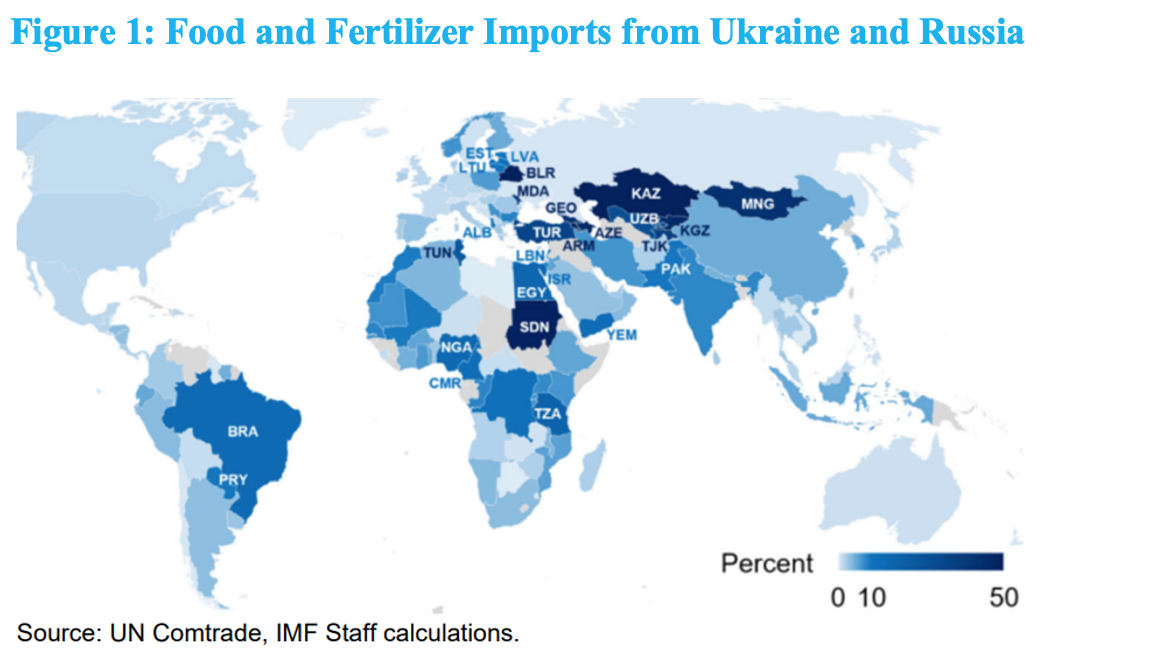
The data presented in Figure 1 highlights the importation of food and fertilizer from Ukraine and Russia, which has significant consequences for Africa. The rise in fertilizer prices may result in a significant decline in short-term agricultural production for the season. Some studies estimate that the reduction in fertilizer imports could cause a minimum drop of one-third in food production across the continent (Ghenna, 2022). The decline in food production in Africa, as indicated by reduced fertilizer imports, could result in persistent food insecurity and an increase in hunger levels on the continent. This could pose a threat to the overall stability of Africa.
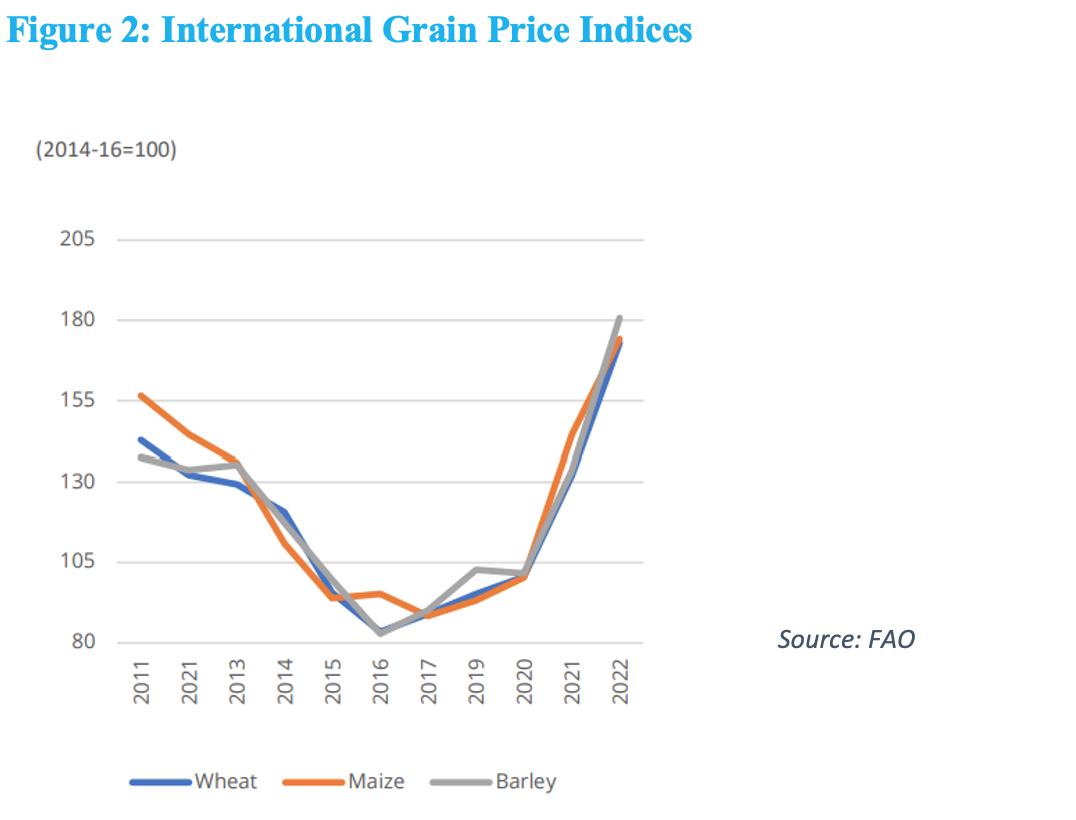
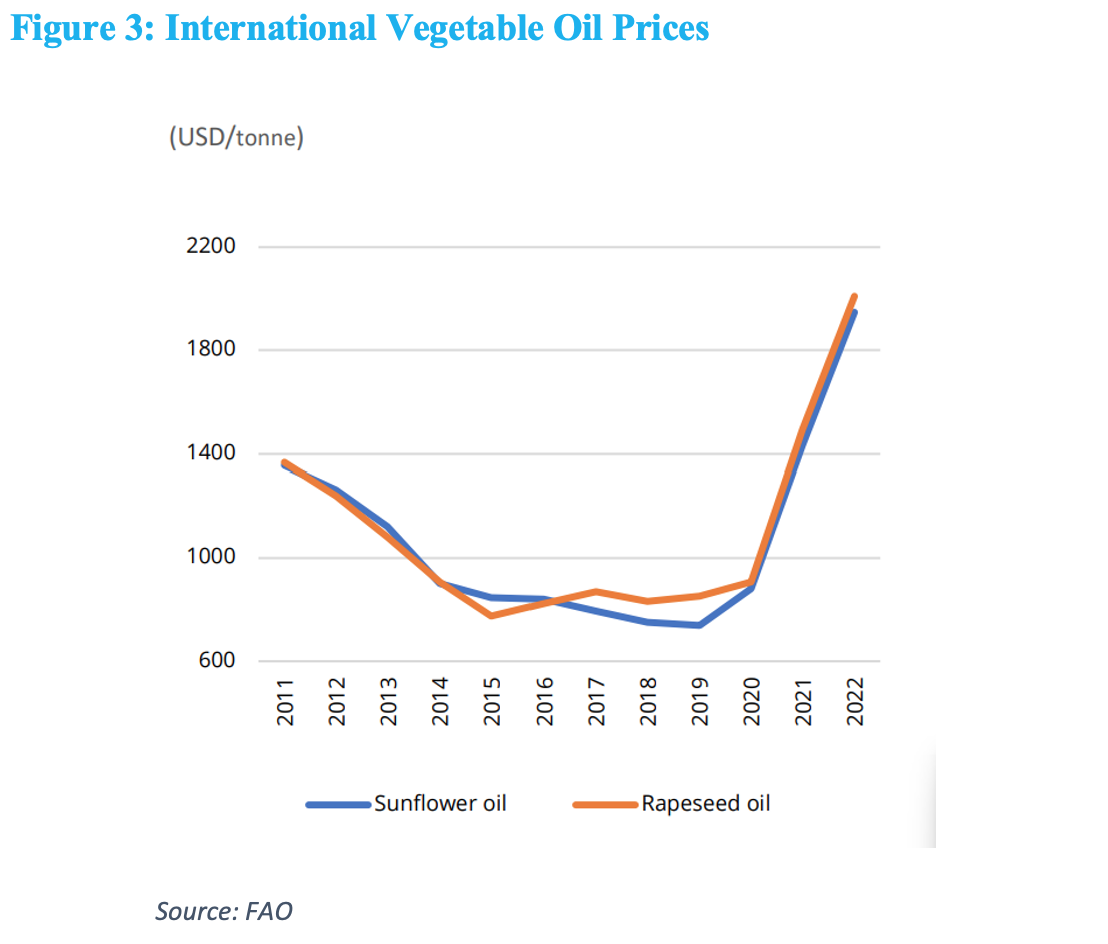
Figures 2 and 3 show the increase in grain prices and vegetable oil prices arising from the impact of the ongoing war in Ukraine. This has significant implications for food security and the economy in Africa. The rise in prices can lead to decreased accessibility and affordability of staple foods, exacerbating food insecurity in vulnerable populations. Additionally, it can lead to inflation, affecting the purchasing power of consumers and potentially causing economic strain, which could lead to an increase in crime rates. The increase in prices can also lead to a shift in demand towards cheaper, less-nutritious alternatives, potentially leading to dietary changes and diet-related health issues, which could threaten the wellbeing of Africans. That being the case, it is crucial for governments and relevant stakeholders to closely monitor and address the impact of such price increases, to ensure food security and stability.
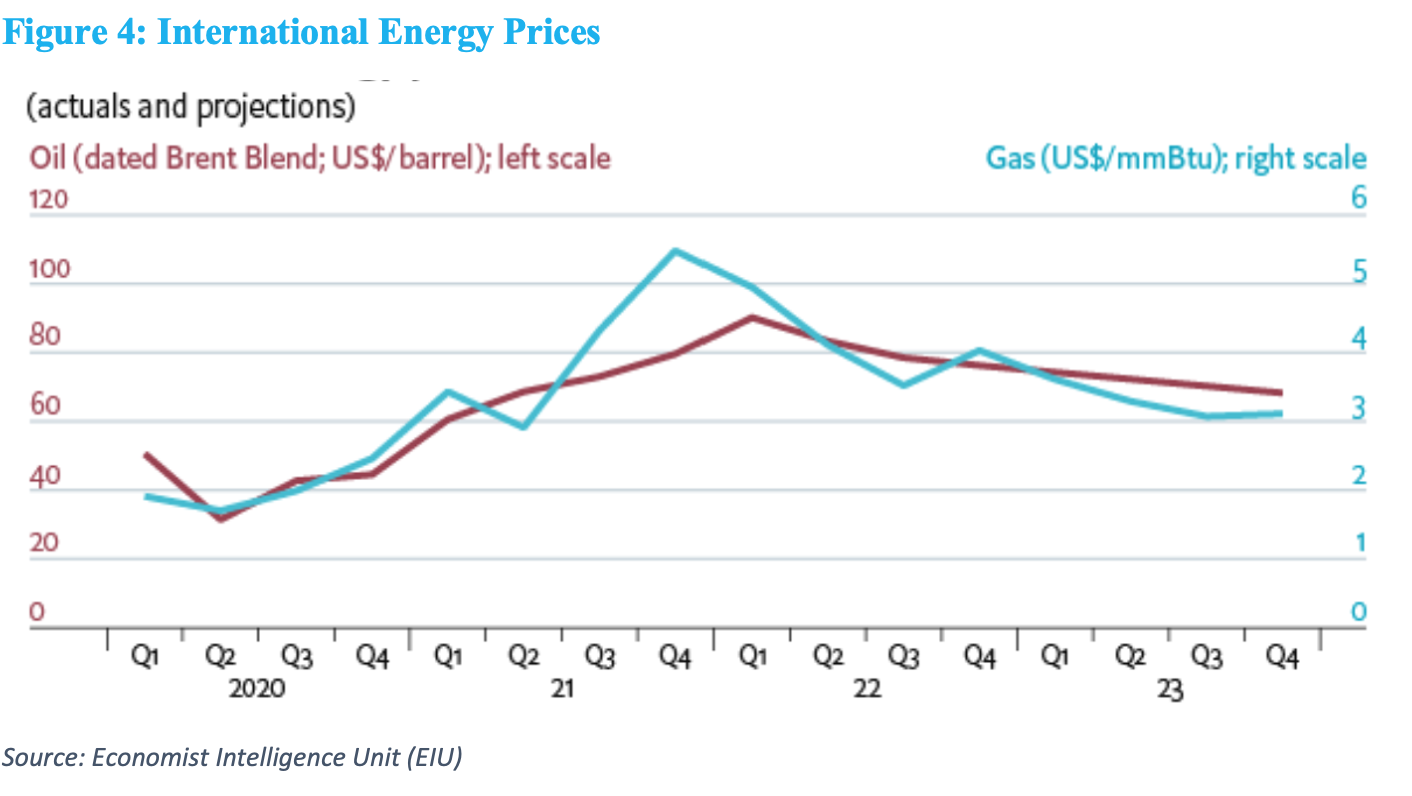
Increased energy prices, as indicated in Figure 4, can have significant impacts on food security and national security. The higher energy prices will lead to an increase in the cost of producing, transporting, and storing food, which can result in a rise in food prices and a decrease in food availability in Africa. This, in turn, can lead to food insecurity, especially among vulnerable populations already facing absolute poverty, and unable to afford three daily meals, before the conflict started. Furthermore, higher energy prices can have a negative impact on national security by affecting economic stability, causing inflation and increased poverty, and leading to social unrest. In short, the increase in energy prices indicated in Figure 4 highlights the need for proper energy management and the importance of energy security in maintaining food security and stability across the continent.
- Understanding the Intersection of Food and National Security
Food and national security intersect in various ways, including food security, food safety, and food sovereignty. However, in this case, the focus is on food security, which relates to the availability, accessibility, and affordability of sufficient, safe, and nutritious food for all people at all times. The intersection of food and national security can be seen in the context of the Russia-Ukraine crisis. The crisis has had an impact on food security and food sovereignty across Africa, with some countries failing to control their agriculture production systems due to disruption in both the energy and fertilizer supply chains.
Two-thirds of the global extremely poor population live in sub-Saharan Africa (Schoch & Lakner, 2020). In 2021, it was estimated that 490 million people in Africa live below the poverty threshold of 1.90 PPP$/day (UNCTAD, 2021). This highlights the lack of access to sufficient, safe, and nutritious food for many Africans, hindering their ability to contribute to national development, and resulting in economic and human security threats.
The UN World Food Program has warned that a fourth failed rainy season in the Horn of Africa could worsen the hunger crisis, affecting 13 million people in Kenya, Ethiopia, and Somalia (Gebre, 2022). Additionally, the ongoing war between Russia and Ukraine is expected to disrupt food security in the region as 90% of wheat imports in eastern Africa come from Russia and Ukraine (Mureithi,2022), while 80% of wheat imports in North Africa, Nigeria, and South Africa also come from these countries (Sacko & Mayaki, 2022). To prevent future food deficits, African governments must invest in becoming net agricultural exporters and take advantage of the African Continental Free Trade Area. Figure 5 gives a sense of wheat import dependency on Russia and Ukraine among African countries, which is contributing to the current food insecurity in Africa.
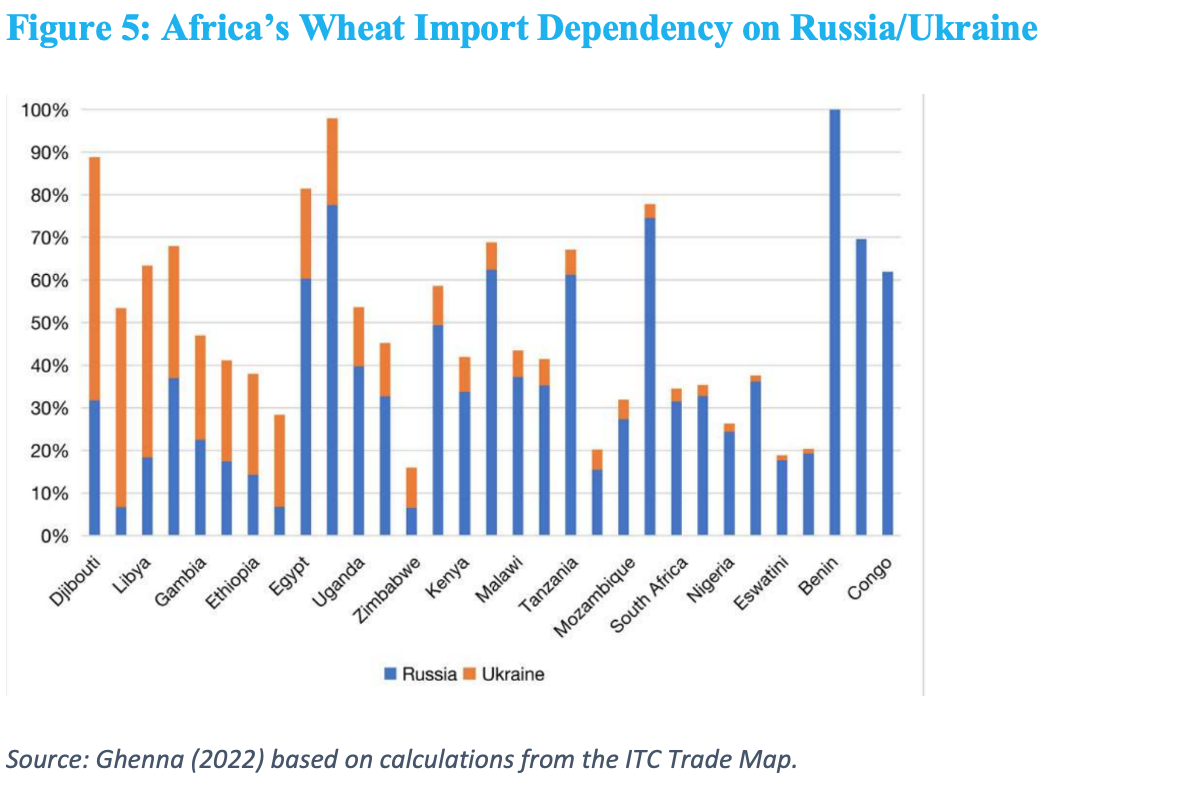
The disruption of oil prices and an increase in fuel prices due to Russia being the world’s third-largest oil producer (IEA, 2022) may also result in higher food prices in Africa, particularly in urban centers, and could lead to socio-economic hardships and political instability. On the other hand, ongoing crises, conflicts, poverty, and threats in some African countries may drive marginalized communities to engage in violent extremism and terrorism.
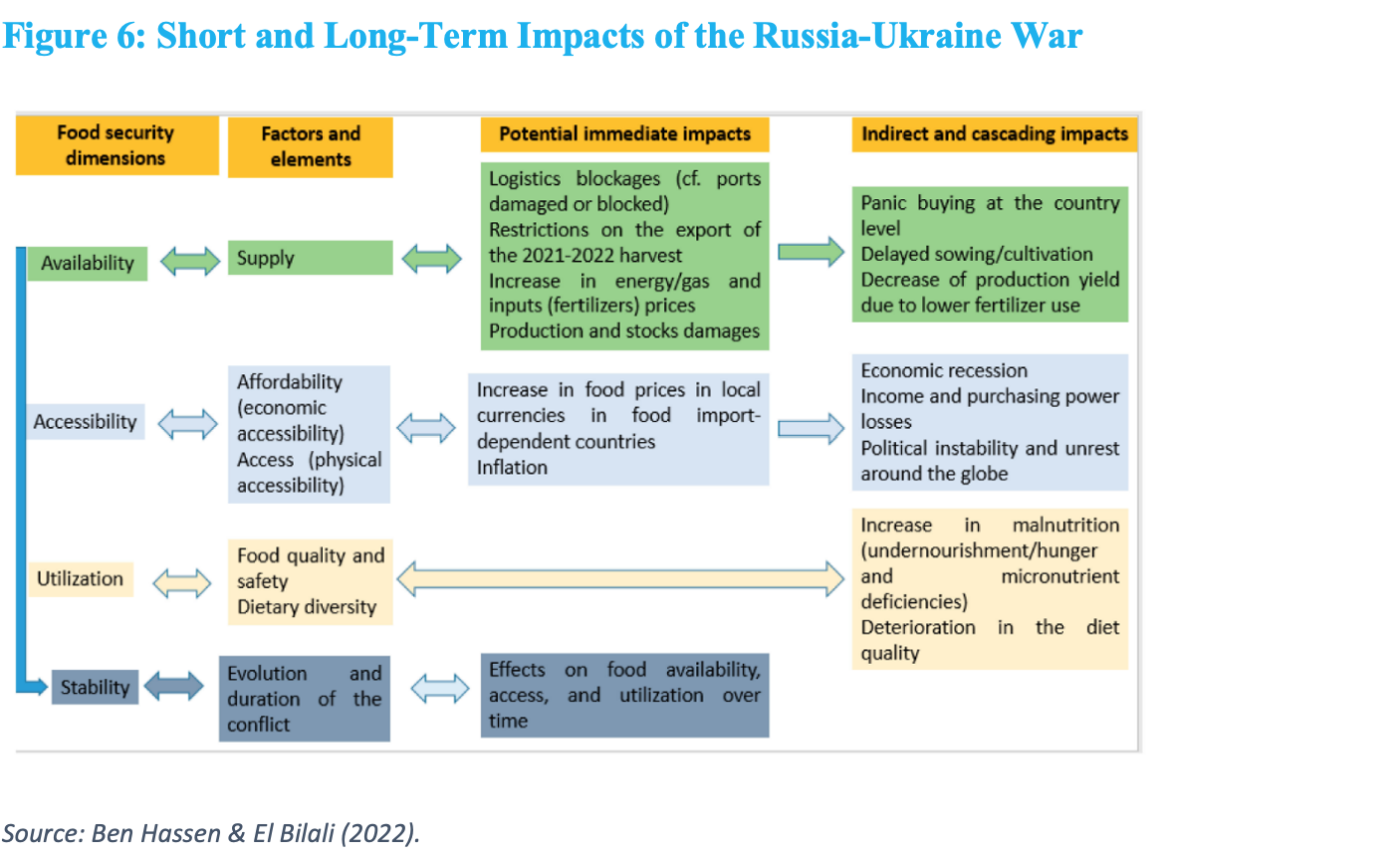
The interconnectedness of food security and other socio-economic factors highlights the significance of ensuring food security in Africa for the preservation of national security. Figure 6 presents the impact of the Russia-Ukraine war and highlights the need for African governments to prioritize access to food for their citizens. This is in line with the statement made by the UN World Food Program’s Executive Director, David Beasley, that “without food security, you will have no other security.”[SG1]
The lack of food security in Africa poses a threat to various aspects of national security, including political stability, military readiness, social cohesion, and economic growth. A shortage of food can lead to competition for resources, which in turn can cause internal conflicts and criminal activities. Economic stress, poverty, and food insecurity can also lead to engaging in criminal behavior and exploitation of vulnerable populations. Furthermore, food-related crimes, such as food fraud and counterfeiting, and social instability can arise. The lack of access to food and its affordability can result in higher crime rates in impoverished neighborhoods.
Therefore, African governments must take deliberate measures to address the challenges to food security, including increasing food production and reducing dependence on imports. This will ensure that the continent can fully realize its potential in agriculture and can secure its food supply, contributing to the overall stability and security of the continent.
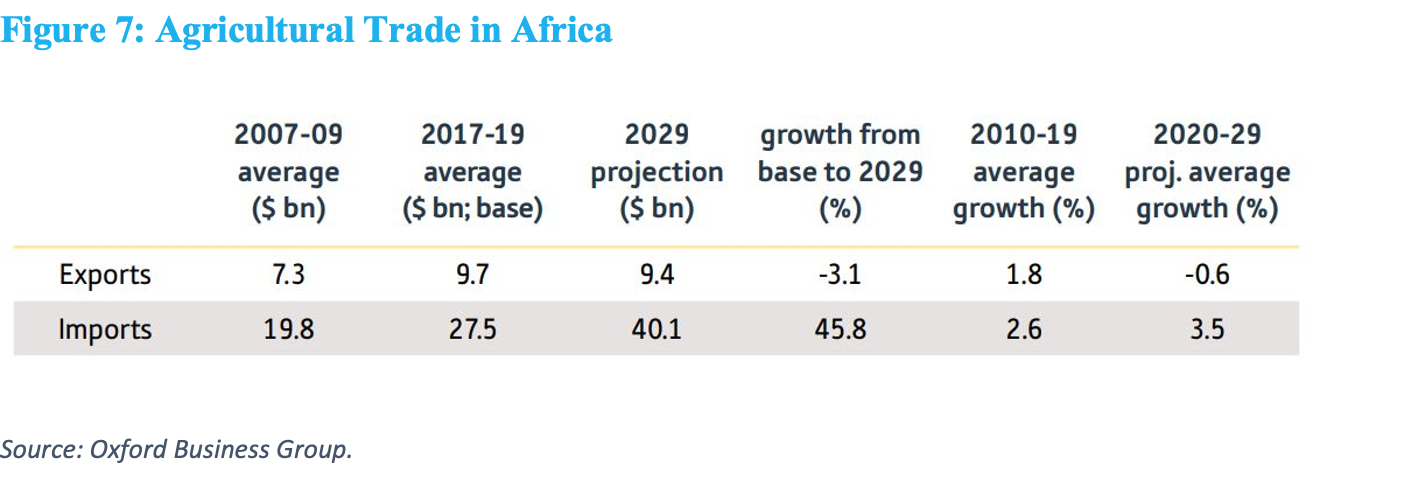
Source: Oxford Business Group.
Sub-Saharan Africa’s agricultural sector contributes about 23% of its GDP (Goedde et al, 2019). Despite the importance of this sector, the continent's food security remains threatened, as is evident from the trade balance of agricultural exports and imports shown in Figure 8. The data depicted reveals that Africa is not fully utilizing its vast potential arable land to meet its food demands, which results in a persistent reliance on food imports. This trend is projected to worsen in the future, with food-import levels expected to increase by 2029 if proactive measures are not taken to reduce the dependency. The Russia-Ukraine conflict serves as a cautionary tale and highlights the need for Africa to address its food-security challenges.
- Lessons Learned from the Russia-Ukraine Conflict for African Policymakers
The conflict between Russia and Ukraine serves as a powerful reminder of the importance of food security in times of conflict. African policymakers can learn several lessons from this conflict, such as the need to build a resilient food system that can withstand political and economic shocks, the importance of reducing dependence on food imports, and the need to promote local agriculture and food production. These lessons are particularly relevant given the increasing frequency of conflict and instability in many African countries (Smith, 2018).
Moreover, the conflict between Russia and Ukraine highlights the importance of food security for national security, and should serve as a cautionary tale for African policymakers. The disruption of food supplies and the sharp increases in food prices in Africa demonstrate the potential for food security to play a major role in national security (Jones, 2019). As such, African policymakers must prioritize food security and take steps to build a resilient food system that can withstand the shocks of geopolitical conflicts. This will not only help ensure food security for the region's population, but will also contribute to the stability and security of the entire African continent (Brown, 2021).
Furthermore, to ensure food security in times of global conflicts such as the Russia-Ukraine war, African policymakers must prioritize building resilience in the region’s food systems. This means strengthening the capacity of local communities to produce and access food, promoting food self-sufficiency, and investing in infrastructure and technology that can support the food system even in times of crisis. In addition, policymakers must also take steps to reduce the risk of food-price spikes and food shortages, which can be destabilizing and can contribute to internal instability.
- Policy Recommendations
To mitigate the risks of food insecurity which can in turn lead to national security threats, African countries should:
- Diversify food sources to reduce dependence on a few countries for food imports.
- Implement programs to mitigate the impact of food insecurity in conflict-affected regions and address socio-economic challenges.
- Encourage and support the development of local agriculture industries in African countries, to reduce dependence on imports and ensure food self-sufficiency.
- Invest in the development of infrastructure for the storage, transportation, and distribution of food, to improve the resilience of the food supply chain.
- Promote sustainable agriculture practices and conservation of fertile lands to enhance food production and maintain food security in the long run.
- Encourage the development of safety nets and food-assistance programs for the most vulnerable populations to mitigate the impact of food insecurity.
- Collaborate with international organizations, non-governmental organizations, and other stakeholders to address the root causes of food insecurity, and work towards achieving global food security.
- Provide support for small-scale farmers and rural development programs.
- Promote investment in agricultural production to become net agricultural exporters
- Conclusion
In conclusion, food security is a crucial aspect of enhancing the national security of African countries. The ongoing war between Russia and Ukraine highlights the need for the continent to ensure that its citizens have access to affordable, nutritious food for a healthy and productive population. Adequate food access will also minimize the potential for internal conflicts caused by supply-chain disruptions.
To address this, developing short and long-term strategies to secure Africa's food supply by utilizing uncultivated arable land will be a significant step toward food security in the region. Such efforts will strengthen the food supply chain and national security system, mitigating vulnerabilities that can lead to social, political, and economic instability. Failure to address food insecurity can also provide opportunities for terrorist organizations to exploit the situation and compromise national security.
Therefore, the Russia-Ukraine crisis emphasizes the vulnerability of some African countries to external and multidimensional shocks, and highlights the interconnection between the energy sector, agricultural development, human security, and national security interests. Ensuring food security for the continent is crucial to maintain stability and prevent threats to national security. In addition, the crisis has highlighted the interplay between food and national security and how geopolitical conflicts, such as the ongoing war in Ukraine, can disrupt food security and affect not only the parties directly involved, but also other parts of the world, particularly Africa.
References
- AUDA-NEPAD (2022). Russia-Ukraine Conflict: Its Consequences for Africa.
- Ben Hassen, T. & El Bilali, H. (2022). Impacts of the Russia-Ukraine War on Global Food Security: Towards More Sustainable and Resilient Food Systems?. MDPI Journal.
- Brown, A. (2021). The Intersection of Food Security and National Security in Africa. Journal of African Studies, 35(2), 123-139.
- Constain, F. (n.d). Food Security is Essential for National Security. Retrieved from https://www.foodethicscouncil.org/food-security-is-essential-for-national-security/
- Food and Agriculture Organization of the United Nations. (2021). Food security. Retrieved from http://www.fao.org/food-security/what-is-food-security/en/
- Gebre, S. (2022). Worst Drought in 40 Years Threatens Millions in Horn of Africa. Retrieved from https://www.bloomberg.com/news/articles/2022-04-07/worst-drought-in-40-years-threatens-millions-in-horn-of-africa
- Ghenna, K. (2022). Impact of Ukraine war on commodities and Africa: possible policy responses and opportunities. Pan African Chamber of Commerce and Industry.
- Goedde, L. and Ooko-Ombaka, A. et al (2019). Winning in Africa’s Agricultural Markets. Retrieved from https://www.mckinsey.com/industries/agriculture/our-insights/winning-in-africas-agricultural-market
- GMO Global Market Observation. (2014). The impact of the Russia-Ukraine conflict on global food security. Retrieved from https://gmo.com/docs/GMO_Research_The_Impact_of_the_Russia-Ukraine_Conflict_on_Global_Food_Security.pdf
- IEA (2022). Oil Market and Russian Supply. Retrieved from Oil Market and Russian Supply – Russian supplies to global energy markets – Analysis - IEA
- Jones, J. (2019). The Impact of Political Conflicts on Food Security in Africa. African Journal of Political Science, 12(3), 189-202.
- Lago, R. (2022). What the Russia-Ukraine conflict means for African economies.Retrieved from https://www.africanews.com/2022/03/03/what-the-russia-ukraine-conflict-means-for-african-economies-business-africa//
- Mureithi, C. (2022). The Russia-Ukraine war threatens Africa’s wheat supply. Retrieved from https://qz.com/africa/2141561/the-war-in-ukraine-war-threatens-africas-wheat-supply
- Sacko,J. & Mayaki, I. (2022). How the Russia-Ukraine conflict impacts Africa. Retrieved from https://www.un.org/africarenewal/magazine/may-2022/how-russia-ukraine-conflict%C2%A0impacts-africa
- Schoch, M. and Lakner, C. (2020). The number of poor people continues to rise in Sub-Saharan Africa, despite a slow decline in the poverty rate. Retrieved from https://blogs.worldbank.org/opendata/number-poor-people-continues-rise-sub-saharan-africa-despite-slow-decline-poverty-rate
- Smith, S. (2018). Building Resilience in African Food Systems: Lessons from the Russia-Ukraine Conflict. Food Policy, 43(6), 789-798.
- Sureli, A. (n.d).Hunger: A National Security Threat. Retrieved from https://www.un.org/en/chronicle/article/hunger-national-security-threat
- UNCTAD (2021). Reaping the potential benefits of the African Continental Free Trade Area for inclusive growth. Press Release, Retrieved from https://unctad.org/press-material/facts-and-figures-7
- World Food Programme. (2021). Hunger in Africa. Retrieved from https://www.wfp.org/hunger/africa
- World Vision (2021). Africa hunger, famine: Facts, FAQs, and how to help. Retrieved from Africa hunger, famine: Facts, FAQs, and how to help | World Vision
List of Figures
- Figure 1: Source: UN Comtrade, IMF Staff Calculations
- Figure 2: Source: FAO
- Figure 3: Source: FAO
- Figure 4: Source: Economist Intelligence Unit (EIU)
- Figure 5: Source: Ghenna (2022) based on calculations from the ITC Trade Map
- Figure 6 : Source: Ben Hassen & El Bilali (2022)
- Figure 7: Source: Oxford Business Group
Author is an Alumnus of the 2018 Atlantic Dialogues Emerging Leaders Program.

